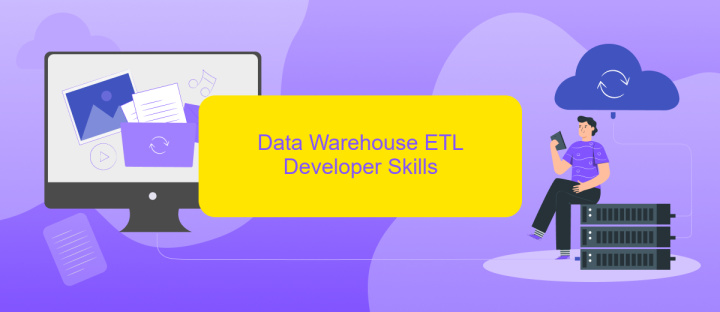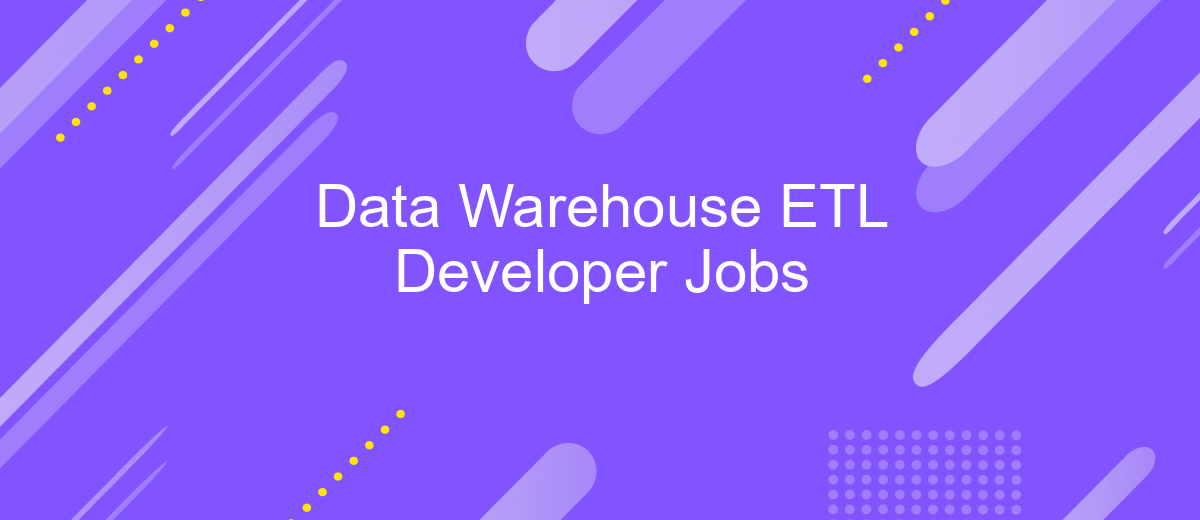Data Warehouse ETL Developer Jobs
As the backbone of modern data management, Data Warehouse ETL Developers play a crucial role in transforming raw data into actionable insights. These professionals are responsible for designing, developing, and maintaining ETL processes that ensure data integrity and accessibility. In this article, we explore the key responsibilities, required skills, and career prospects for Data Warehouse ETL Developers in today's rapidly evolving tech landscape.
Introduction
The role of a Data Warehouse ETL Developer is becoming increasingly crucial in today's data-driven world. These professionals are responsible for designing, developing, and maintaining data warehouse systems, ensuring that data is efficiently extracted, transformed, and loaded (ETL) from various sources. Their work supports business intelligence activities, enabling organizations to make informed decisions based on accurate and timely data.
- Designing and implementing ETL processes
- Maintaining data integrity and quality
- Optimizing data warehouse performance
- Collaborating with data analysts and business stakeholders
One of the key aspects of a Data Warehouse ETL Developer's job is integrating diverse data sources. Tools like ApiX-Drive can significantly streamline this process by automating data integration tasks, thus enhancing efficiency and reducing manual errors. By leveraging such services, developers can focus more on optimizing data flows and ensuring the robustness of the data warehouse system.
Data Warehouse ETL Developer Job Description

A Data Warehouse ETL Developer is responsible for designing, developing, and maintaining data warehouse systems to ensure efficient data storage and retrieval. They work closely with data analysts, database administrators, and business stakeholders to understand data requirements and translate them into technical specifications. Key responsibilities include extracting, transforming, and loading (ETL) data from various sources into the data warehouse, optimizing ETL processes for performance, and ensuring data quality and integrity.
In addition to technical skills, a Data Warehouse ETL Developer should be proficient in using integration tools and services to streamline data workflows. For instance, ApiX-Drive can be utilized to automate and manage data integrations between different platforms, enhancing the overall efficiency of ETL processes. The role also involves troubleshooting data issues, performing regular data validation, and staying updated with the latest industry trends and technologies to continuously improve data warehousing solutions.
Data Warehouse ETL Developer Skills

To excel as a Data Warehouse ETL Developer, one must possess a diverse set of technical and analytical skills. These skills are essential for efficiently managing data extraction, transformation, and loading processes, ensuring data integrity and optimal performance.
- SQL Proficiency: Mastery in SQL is crucial for querying, manipulating, and managing databases.
- Data Modeling: Understanding of data warehousing concepts, including star and snowflake schemas.
- ETL Tools: Experience with ETL tools like Informatica, Talend, or Apache Nifi for data integration and workflow automation.
- Programming Skills: Knowledge of programming languages such as Python, Java, or Scala for custom ETL processes.
- API Integration: Familiarity with services like ApiX-Drive for seamless integration of various data sources and applications.
- Performance Tuning: Ability to optimize ETL processes for speed and efficiency.
- Data Quality Management: Skills in ensuring data accuracy, consistency, and reliability.
Additionally, strong problem-solving abilities and attention to detail are vital. Effective communication skills are also important, as ETL Developers often collaborate with data analysts, business stakeholders, and IT teams to deliver robust data solutions.
Data Warehouse ETL Developer Salary

The salary of a Data Warehouse ETL Developer can vary significantly based on factors such as location, experience, and industry. On average, these professionals can expect to earn a competitive salary that reflects their specialized skills and the demand for their expertise.
In the United States, the average annual salary for a Data Warehouse ETL Developer ranges from ,000 to 0,000. Entry-level positions may start at around ,000, while highly experienced developers can earn upwards of 0,000 per year.
- Entry-level: ,000 - ,000
- Mid-level: ,000 - 0,000
- Senior-level: 0,000 - 0,000+
In addition to base salary, many employers offer benefits such as health insurance, retirement plans, and performance bonuses. The growing need for data integration and management solutions, especially with tools like ApiX-Drive, further enhances the value and compensation of skilled Data Warehouse ETL Developers in the market.
Data Warehouse ETL Developer Career Path
The career path of a Data Warehouse ETL Developer typically begins with a strong foundation in computer science, data management, and database technologies. Entry-level positions often require proficiency in SQL, ETL tools, and data modeling. As developers gain experience, they may take on more complex projects involving data integration, transformation, and loading processes. Continuous learning and staying updated with the latest technologies are crucial for career advancement. Certifications in ETL tools and data warehousing can also enhance career prospects.
Mid-level positions often involve designing and implementing advanced ETL processes, optimizing data workflows, and ensuring data quality and integrity. Developers may also work with integration services like ApiX-Drive to streamline data flows across various platforms. Senior roles typically focus on strategic planning, team leadership, and architecting comprehensive data solutions. With further experience, ETL developers can transition into roles such as Data Architects, Data Engineers, or even Data Science roles, leveraging their deep understanding of data systems and processes.
FAQ
What does a Data Warehouse ETL Developer do?
What skills are essential for a Data Warehouse ETL Developer?
How can automation tools assist in the ETL process?
What are the common challenges faced by Data Warehouse ETL Developers?
What industries typically hire Data Warehouse ETL Developers?
Time is the most valuable resource for business today. Almost half of it is wasted on routine tasks. Your employees are constantly forced to perform monotonous tasks that are difficult to classify as important and specialized. You can leave everything as it is by hiring additional employees, or you can automate most of the business processes using the ApiX-Drive online connector to get rid of unnecessary time and money expenses once and for all. The choice is yours!

